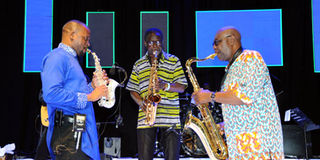Katumwa, Dibango and Siphokazi give music a worthy celebration

(L-R) Isaiah Katumwa, Moses Matovu and Manu Dibango on stage. PHOTO BY EDDIE CHICCO
What you need to know:
- It was a night legendary Manu Dibango serenaded Kampala while the other visitor of the night, Siphokazi from South Africa wasn’t only debunking our definition of music, but rearranging it.
- Known to very few in the audience, she stepped onto the stage backing Katumwa on songs like Mama Africa – very unusually dressed, she was light – in only a dress and flat shoes.
- Besides the drums that were majorly represented by percussions, many of the different instrumentation in the backdrop made an appearance on stage, the most surprising one though was the xylophone as manned by Katumwa – it was a side of him many in the audience were meeting for the first time.
- Cameroonian saxophonist Dibango was too little known to some Ugandans, he is famous for Soul Makosa, the 1972 sensation that was later sampled by Michael Jackson for his Wanna Be Startin’ Somethin’ single, but that’s not all about the song, it literally birthed the Afro-disco fusion.
Probably many even had no idea that 30 April was even Jazz music day!
Yet for a country where good music has been exchanged for sex appeal, you can’t blame the many people that seemed to mind the Johnnie Walker whisky on the tables as the opening acts were on.
It was a night legendary Manu Dibango serenaded Kampala while the other visitor of the night, Siphokazi from South Africa wasn’t only debunking our definition of music, but rearranging it.
Known to very few in the audience, she stepped onto the stage backing Katumwa on songs like Mama Africa – very unusually dressed, she was light – in only a dress and flat shoes.
And just like that, in a flowered sun dress and flat shoes, she sent sexy back from wherever Sheebah Karungi got it, it was time for real singing – no gimmicks and funny make up.
She came to sing, hit the high notes and have fun while at it – her semi live set was one thing many local artistes would have learnt from had they been in attendance.
She had not moved with an entire band, she simply carried a bass guitarist for the thumping effect common with South African kwaito and the rest was done by Charmant Mushaga on the lead guitar, a bankable drummer and two personnel on the keys.
She effortlessly went low or high without putting all her God given energy to waste – for an opener, the tone she set lighted up the entire show and yet, she didn’t really steal it from its main purpose that was celebrating jazz and the legacy of Katumwa’s friend and collaborator Hugh Masekela.
Masekela died at the end of January and having performed with Katumwa almost a year back, the Ugandan brother promised to honor him in concert – And did he?
The show that was mostly dominated by Katumwa had so little as far as celebrating the South African trumpeter cum activist; in fact, it even did quite little in celebrating jazz as a genre but since it was tagged alongside Masekela, a man that every other day denied his place as father of South African jazz, it is safe to say that Katumwa and friends successfully honored him by celebrating music as a whole, not just an element of it.
From songs like Joy, Welcome and Mama Africa, Katumwa has nothing to prove, yet he stayed impressive, not at his best self but still remarkable – this time round, he had stayed away from his usual jungle settings.
With the help of artists Rose Kirumira and Sheila Nakitende, they created a black and white backdrop that celebrated different aspects of modern African music, curated as an installation, the backdrop had fusions of African instrumentation that included the xylophone, drums and long drum with guitars, piano and of course the sax.
Besides the drums that were majorly represented by percussions, many of the different instrumentation in the backdrop made an appearance on stage, the most surprising one though was the xylophone as manned by Katumwa – it was a side of him many in the audience were meeting for the first time.
Cameroonian saxophonist Dibango was too little known to some Ugandans, he is famous for Soul Makosa, the 1972 sensation that was later sampled by Michael Jackson for his Wanna Be Startin’ Somethin’ single, but that’s not all about the song, it literally birthed the Afro-disco fusion.
With a crew whose average age could have been 50, Dibango went into areas many in the audience didn’t envision themselves in at the beginning of the night – a soul free spirited performance that called for a keen ear than a busy waist.
Then his calculated collaborations that brought Afrigo Band’s front man Moses Matovu and Katumwa together, totally legendary.
It was hard to say whether that or the synchronized version of Masekela’s Grazing Grass by the two were the night’s highlights, but regardless of what stood out, it was a night that music was celebrated beyond a genre.


